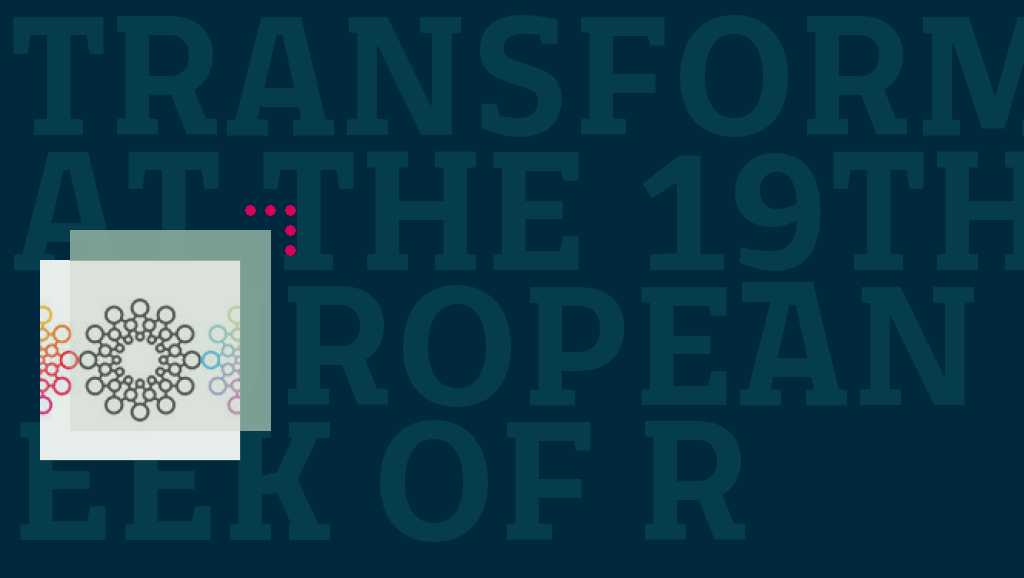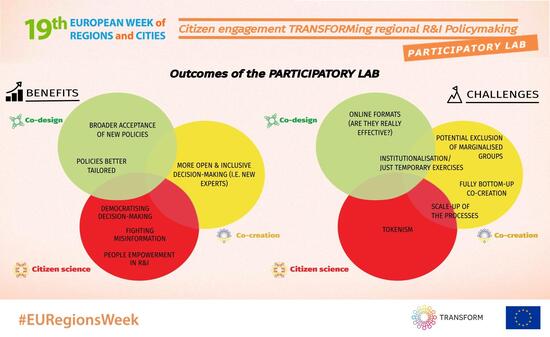Bruxelles, 11 – 14 October, 2021.
The European Week of Regions and Cities is the biggest annual Brussels-based event dedicated to cohesion policy. It brings together regions and cities from all over Europe, including politicians, administrators, experts and academics in a four-day event that boasts several interesting formats (the opening session was run following a TV chat-show format, with several VIP panelists, including European Committee of the Regions President Apostolos Tzitzikostas, European Commissioner Elisa Ferreira and European Parliament President David Sassoli).
Citizen engagement TRANSFORMing regional R&I policymaking
Day 2 of the event saw representatives of the Bassetti Foundation participate, as Angela Simone and the TRANSFORM team held a participatory lab in which they presented their project (for an overview see here), raising the issue of how strategies can be developed that enable regional policymakers to best serve their populations and strengthen trust between institutions and citizens. In the EU H2020 TRANSFORM project, citizen science, co-design and co-creation are being applied to regional R&I decision-making in Catalonia, Lombardy and Brussels-Capital.
Michael Creek of Stickydot opened proceedings with a short getting-to-know everybody ice-breaker, before introducing Project Coordinator Angela Simone, the first of three speakers, each of whom presented the work of their regional clusters.
After offering a summary of the main elements involved in the project as a whole, Simone explained how her Lombardy based cluster works on participatory agenda setting using a co-design approach. The team’s focus is on the Region’s 3-year strategic plan and is in particular linked to its smart specialization strategy, with the aim of contributing towards setting objectives and priorities for research and innovation.
The approach taken aims to gather citizens’ opinions and wishes using a mixed qualitative and quantitative approach, allowing needs expressed directly through citizens’ voices to guide the strategy. A 1000 respondent survey looked at territorial and familial needs while a deliberative workshop addressed issues around a just energy transformation.
The outcomes from the research have already been accepted and are being used by the regional government to define and draft their 3-year strategic plan.
During a short question and answer session (led by Michael Creek), Simone referred to how the impact of living through the COVID-19 emergency had led to priority changes (particularly regarding school and education facilities) and that some evidence of a potential generational clash could be seen during the deliberative workshop.
Marzia Mazzonetto then took the floor to describe the work of the Brussels-Capital cluster in co-creation (which could be seen as the follow-on step to co-design), a related approach that leads towards the increasing citizen engagement goal shared by the other teams.
Mazzonetto expressed many similar sentiments to those previously outlined by Angela Simone, including the need for R&I to be more connected to citizens’ needs and the problem of low uptake of top-down determined practices. Focusing on circular economy, the approach highlights approaches that can help in bringing R&I closer to the community and its needs, a move seen as the key to economic transition.
Within the co-creation process, citizen engagement contributes to exploring potential uses and impacts of innovation, creating a more active role for citizens in an agile process that supports innovators.
The speaker offered the example of a technique that allows anybody to measure water quality, including describing workshops focusing on aspects of individual water consumption aimed at finding shared solutions and understandings of the best ways to create and use innovation via harnessing collective intelligence.
This process involves both bottom up as well as university innovations and differs slightly from the co-design approach taken by the Lombardy group: design is about defining shared priorities (including support) while creation is the step that follows and which aims at a concrete solution (reducing bottled water consumption for example).
The third speaker was Diana Reinoso who presented the work of the Catalonia cluster. The approach taken here is based upon data collection using citizen science and what the speaker described as extreme citizen science, a form that includes the definition of the question, collection and analysis of data and the creation of an action plan.
The speaker described how citizen science can be useful in aligning policy towards needs and expectations while also generating trust, offering 2 pilot project examples: Waste: citizen science for the co design and implementation of an interactive waste game, and Health: endometriosis in the first person: participatory research on experiences.
The waste pilot involves the implementation of innovative waste collection systems via engagement with a host of different people and profiles in the design of an interactive waste game. The aim is to provide information on waste management and its impact and collect information about needs and barriers. A digital version of the game is currently under development that will then be implemented through schools, as the students act as ambassadors and engage with their surrounding communities. This will lead to the generation of a policy brief and recommendations.
The health pilot involves qualitative research involving 25 women with endometriosis. Once more the aim is to develop a policy brief and recommendations and improve the Catalan protocol on support and care for these women and their families.
In answer to a question posed by Michael Creek, Reinoso concluded by adding that the biggest challenge faced in engaging citizen science and policymaking was finding a common view of the objectives.
Participants were then invited to join a breakout room of their choice where we were asked to write our thoughts on a Padlet and discuss the results. We then re-joined the main room for a presentation of each breakout Padlet page. Amongst others, the following comments and thoughts led to lively discussion:
The connection between citizens and scientists and search for common language.
Participation Improves interest in other fields.
In a comparison between engagement in illness and other topics, suffering brings engagement.
What can this type of project and approach actually achieve?
How co-design could enhance regional R&I decision making via inclusion from the beginning.
Agenda setting can be better tailored to needs.
Support the aims of governance.
There is often broader acceptance of plans if citizens feel they have contributed.
Citizens are enthusiastic as they feel they have a seat round the decision-making table.
What do we mean by regional decision-making? How can citizens contribute and how is it funded?
How can we improve the participation of fragile or less represented groups?
How can the processes be more open and inclusive?
Do we have access to those who can implement the findings?
Only a small part of the population joins and they represent their own interests.
The importance of defining a common objective that is understood by all stakeholders, but also the difficulties in achieving and maintain them.
The acceptance (or not) of a policy proposal. How can we commit the authority to integrating these opinions and what are the risks of instrumentalization?
How can expectations on all sides be managed.
The final few minutes were dedicated to an open discussion between participants with the following topics addressed:
There might be a language problem with communication strategies when publishing results. This is a very challenging problem but it is being addressed by various projects.
How can you clearly communicate scientific information?
How can such an approach be scaled up? The World Wide View on Climate and Energy experiences was offered as an example of a possible approach, requiring the commitment of the public authorities for implimentation.
The European Commission is helping by integrating these issues and approaches into Horizon Europe, but there is a lack of knowledge about implementation. The OECD is also at the forefront as the recent report Innovative Citizen Participation and New Democratic Institutions: Catching the Deliberative Wave (translated into Italian as part of the Transform project) demonstrates.
As practitioners we need to be critical about how we address citizens. Do we want them to work within our bubble? We need to train ourselves.
This was a stimulating and enjoyable event and I would like to thank and congratulate all of those who participated.
Further information about the TRANSFORM project is available through the project website and this European Policy Brief.
Video of the event is available here, while many more videos of the event can be enjoyed here.
———————–

















